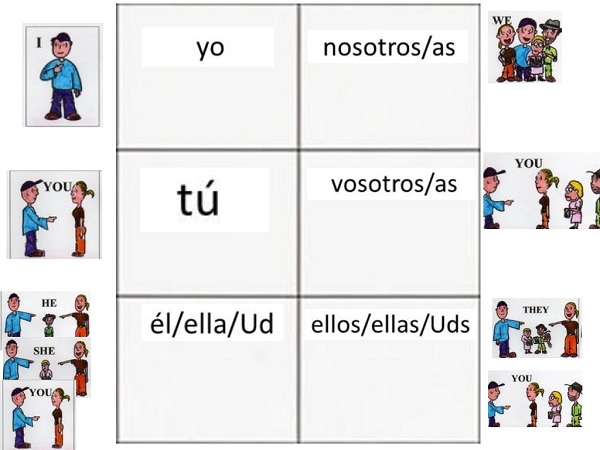A subject pronoun is a personal pronoun used as the subject of a verb. It's a pronoun that identifies who or what is performing the action of a verb. Spanish pronouns are used much like their English counterparts. However, there are still some twists.
Spanish subject pronouns
The table below shows a list of subject pronouns in Spanish.
Subject pronouns | English | Person | Number/Gender | Formality |
| yo | I | first person | singular | |
| nosotros | we | first person | plural/masculine | |
| nosotras | we | first person | plural/feminine | |
| tú | you | second person | singular | informal |
| vos | you | second person | singular | informal |
| usted | you | second person | singular | formal |
| ustedes | you all | second person | plural | formal in Spain, both informal and informal in Latin America) |
| vosotros | you all | second person | plural/masculine | informal (Spain) |
| vosotras | you all | second person | plural/feminine | informal (Spain) |
| él | he | third person | singular | masculine |
| ella | she | third person | singular | feminine |
| ellos | they | third person | plural | masculine |
| ellas | they | third person | plural | feminine |

Subject pronouns in Spanish
Yo
Use "yo" to say "I" in Spanish. It isn't necessary to capitalize yo unless it starts a sentence.
For example:
Yo hablo español - I speak Spanish
Mi mamá y yo fuimos a la tienda - My mom and I went to the store
Tú/Vos/Usted
Unlike in English, Spanish has both formal and informal form of the word "you". While "tú" is used when you are talking to a friend, a child, or a relative, etc, "usted" is used to address someone older, a superior, a person you do not know, or someone you respect.
See also: Tú vs. Usted
Vos is also informal singular second person form. It is used instead of "tú" in some countries such as Costa Rica, Argentina, Uruguay, Paraguay, etc.
Él/Ella
Él and ella are used to say he/she in English. They are often used in place of a person's name.
Nosotros/Nosotras
Nostros and nosotras are used to say "We" in English. They are used when you want to speak about a group of which you're a part. The main difference between these two subject pronouns is gender.
While "nosotros" is used to refer to a group of men only or a mixed group of men and women, "nosotras" is used only when the entire group is female. Even if there are nine women and only one man in a group, the group is still considered masculine. And nosotros should be used. So regardless of the size of a group, if it includes just one male, use nosotros.
Vosotros/Vosotras/Ustedes
Vosotros and vosotras are the informal plural "you". However, they are used primarily in Spain. You won't hear them in Latin America. They follow the same rules for gender as nosotros and nosotras.
Ustedes is used in both formal and informal situations to mean "you all" in Latin America. However, in Spain, ustedes is used only in a formal situation.
Ellos/Ellas
Ellos and ellos are used to say "they" in Spanish. The same gender rules in nosotros and nosotras also apply.
In Spanish, subject pronouns can be omitted while they are required in English. This is because the Spanish verb endings show you who the subject is. So they are primarily used for emphasis or clarity.
See also:
